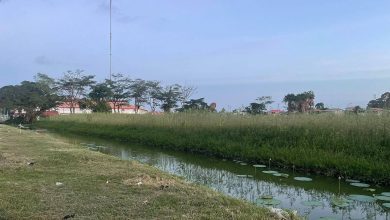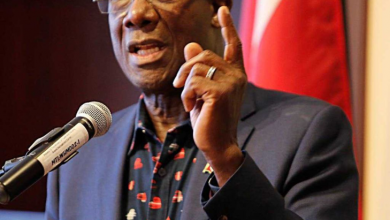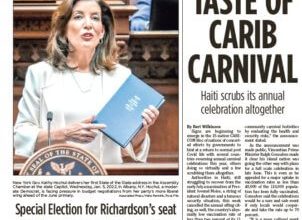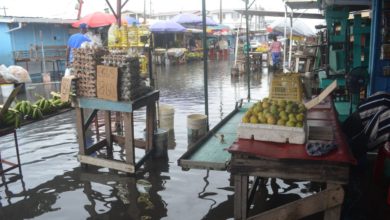Border crossings by Caribbean migrants remain below levels seen in months before Title 42 ended: CBP

The United States Customs and Border Protection (CBP) agency said on Friday that statistics show that border crossings in July by Caribbean and other migrants along the Southwest Border of the United States were lower than in July 2022.
CBP also said Border Patrol encounters remain lower than during the months leading up to the end of the Title 42 public health Order.
Many of the migrants crossing the Southwestern Borders in the US and arriving in New York are nationals of Cuba and Haiti, as well as nationals of Venezuela and Guatemala.
“We remain vigilant and continue to adjust our operational plans to maximize enforcement efforts against those individuals who do not use lawful pathways or processes, knowing that smugglers continue to use disinformation to prey on vulnerable individuals,” said Troy A. Miller, Senior Official Performing the Duties of the Commissioner.
“Every day, the men and women of CBP are rescuing and rendering aid to individuals sent into harm’s way by callous smugglers, while at the same time, increasing seizures of dangerous drugs, and processing high volumes of summer travelers,” he added.
CBP said it is processing all noncitizens under Title 8 immigration authorities, and generally placing noncitizens who cross the border unlawfully into Expedited Removal or Section 240 Removal Proceedings.
Generally, it said noncitizens who cross between the ports of entry or who present themselves at a port of entry without making a CBP One appointment are subject to the Circumvention of Lawful Pathways rule.
This rule presumes asylum ineligibility for those who fail to use lawful processes, with certain exceptions.
“No one should believe the lies of smugglers,” said CBP in a statement. “The border is not open to irregular migration; individuals and families without a legal basis to remain in the United States will be removed.
In July 2023, CBP said it recorded 132,652 encounters between ports of entry along the Southwest Border: a decrease of 27 percent from July 2022 when the Title 42 public health Order was in effect.
It said while total encounters increased from June to July, encounters of Single Adults between ports of entry remained flat, “which is indicative of the success of our work to maximize the use of Expedited Removal after the end of the Title 42 public health Order, which was initially focused primarily on Single Adults.”
Additionally, it said Border Patrol encountered fewer single adults on the Southwest Border in the entire month of July than it did in the early days of May prior to the lifting of Title 42.
In July, CBP said Border Patrol encountered an average of 2,016 Single Adults per day, down from 6,164 per day the first eleven days of May, a decrease of over percent.
Total Southwest Border encounters in July, including individuals who presented at ports of entry with or without a CBP One appointment, were 183,503, a decrease of 8 percent from July 2022.
CBP said it has undertaken significant efforts in recent years to expand capacity to aid and rescue individuals in distress.
CBP said its message for anyone who is thinking of entering the United States without authorization or illegally along the Southwest Border is simple: “don’t do it.”
“When noncitizens cross the border unlawfully, they put their lives in peril,” it said.
The CBP latest data comes as New York Gov. Kathy Hochul said New York is continuing efforts to support Caribbean and other asylum seekers, and to help them find shelter and connect them with critical social services as they arrive in the state.
Hochul said state’s efforts come as New York Attorney General Letitia James has called on the Biden administration to take immediate action to grant work authorization permits for Caribbean and other migrants who are new to the United States.
The New York Governor said the state’s efforts include US$250 million in funding already sent to the city, progress resulting from continued advocacy with the federal government and additional National Guard deployments.
“Since asylum seekers first arrived in New York, we have been providing significant humanitarian aid as New York City works to meet their legal obligation to provide shelter,” Hochul said. “We will continue our efforts to provide financial support, personnel and equipment, and continued advocacy for federal assistance.”
As a part of the US$1 billion in funding Hochul secured in the Fiscal Year 2024 State Budget, the governor advanced US$250 million to the city to reimburse their costs.
She said this financial support will continue as the city continues to make additional financial expenditures.
The governor said the US$250 million payment to New York City will be used to financially support Humanitarian Emergency Response and Relief Centers (HERRC), sanctuary sites, and respite renters, as well as welcome, intake, and navigation centers that provide immediate assistance to asylum seekers.
She said funding in the FY 2024 Budget provides a 29 percent reimbursement to New York City for allowable costs associated with operating these programs.
As part of a coalition of 19 attorneys general, James sent a letter last week to the US Department of Homeland Security (DHS) Secretary Alejandro Mayorkas urging the US administration to resolve the delays and bureaucratic inefficiencies that are preventing migrants from finding work and making it more difficult for states to provide sufficient resources to support migrants.
“For generations, immigrants have come to New York seeking new opportunities for themselves and their families, and recent arrivals are no different,” said Attorney General James. “But bureaucratic delays and a lack of work permits are depriving new immigrants of the chance to create a better life here in America.
“Moreover, these delays are hurting our economy by depriving businesses of a much-needed source of labor. Immigrants helped build the Empire State [New York], and I will continue to fight to make sure they are treated with dignity and have a fair shot at the American dream,” she added.
While many newly-arrived migrants are eligible for work authorization and eager to find employment, James said long processing delays have left many unable to support themselves and their families.
She said this has placed an increasing and unsustainable burden on states that offer support services to ensure that migrants do not go without food, shelter, medical care, and education.
The New York Attorney General said businesses are also experiencing increasing demand for workers in key industries like food service, retail, transportation, and health care.
“Expediting work authorization for migrants will help meet these demands and reduce the risk that workers will be subjected to depressed wages, poor working conditions, or other violations of their rights,” James said.
The coalition also noted that while a significant portion of migrants are immediately eligible for work permits, processing delays have left many waiting 10 months or more for authorization.
Joining Attorney General James in sending the letter are the attorneys general of Arizona, Connecticut, Delaware, Hawaii, Illinois, Maryland, Massachusetts, Michigan, Minnesota, Nevada, New Jersey, New Mexico, Oregon, Pennsylvania, Rhode Island, Vermont, Washington, and the District of Columbia.




